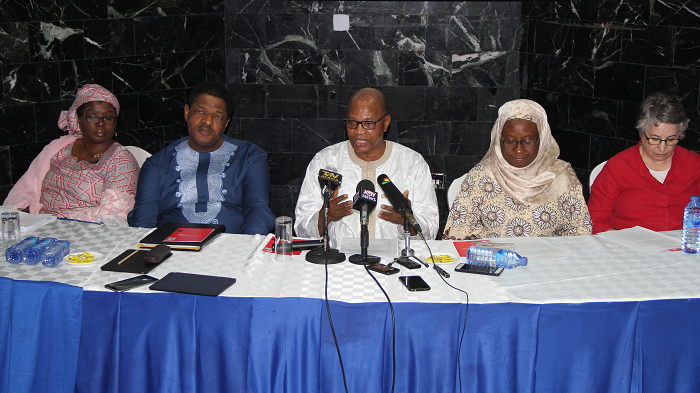From 09 to 12 August 2016, the Economic Community of West African States (ECOWAS), the African Union (AU) and the United Nations (UN) completed a three-day joint high-level mission to Ghana ahead of the general elections of 7th December 2016. Kindly find below the press statement of Mr. Mohamed Ibn Chambas, the Special representative of the Secretary-General and Head of the United Nations Office for West Africa and the Sahel (UNOWAS).
PRESS STATEMENT
“Ladies and Gentlemen of the Medias,
Good afternoon and thank you for joining us for this press conference,
We are completing a three-day joint high-level mission of the Economic Community of West African States (ECOWAS), the African Union (AU) and the United Nations (UN) to Ghana ahead of the general elections of 7th December 2016. The Mission comprises senior officials from the three institutions: the President of the ECOWAS Commission, H.E. Marcel Alain de Souza; and the ECOWAS Commissioner for Political Affairs, Peace and Security, Mrs Halima Ahmed; the AU Commissioner for Political Affairs, H.E. Aisha Laraba Abdullahi; as well as the Special Representative of the UN Secretary-General for West Africa and the Sahel, Dr. Mohamed Ibn Chambas.
The principal objective of the joint mission is to contribute to sustaining democratic governance in Ghana. The upcoming general elections of December will be the last in West Africa for 2016, and it is expected that Ghana will uphold the excellent record of peaceful and credible polls we have witnessed across the sub region in 2015, and so far in 2016. The Mission, among others, sought to: reiterate the strong support of the international community for peaceful, transparent, and credible elections; develop an understanding of the perspectives of Ghanaian stakeholders on key issues and developments ahead of the polls; assess the risks of election-related violence and urge for a peaceful electoral process; explore options to further support dialogue and consensus by stakeholders on critical issues; and gather agreement on all sides for the organization of a Peace Summit which culminates in the signing of a Peace Accord as a reaffirmation of the peace consensus.
In the course of this Mission, consultations were held with the Chief Justice, the Minister of Foreign Affairs and Regional Integration, the Minister of Interior in the presence of the Inspector-General of Police, the Electoral Commission, senior leadership of political parties, the National Peace Council, religious leaders, civil society organizations, and media associations. The delegation also interacted with members of the diplomatic community and the UN Country Team.
The Mission acknowledged the genuine risk of electoral violence and pleaded with representatives of all stakeholders, including the political formations, the civil society organizations and the media, to play their part in erasing or mitigating misunderstandings, which carry a potential to tarnish the conduct of the electoral process. It invites all political parties to avail themselves of existing institutional mechanisms to resolve the various challenges that might arise.
The joint Mission obtained an expression of commitment from the political parties to sign a Code of Conduct ahead of the December elections. The signing of this Agreement -similar to the 2012 Kumasi Declaration-, to be coordinated by the National Peace Council, would cement their commitment to peace before, during and after the elections, and would signal to the population, their intention to cooperate for the protection of democracy, the respect for human rights, and the cultivation of peace.
The Mission also received assurances of the officials in charge of public safety and security that the right to information and the freedom of expression will be guaranteed during the electoral process, including the use of social media. They specifically reiterated their resolute intention to protect lives and property, to continue to ensure the security of the candidates and to dismantle the vigilante groups associated with political parties.
The Mission noted with satisfaction that the stakeholders were able to use legal channels to address their concerns regarding the voters register, as a result of which there is general consensus on a register that can be used for the elections. In that regard, the Mission noted the positive reforms being implemented by the Electoral Commission to further strengthen the electoral process, which would enhance the ability of the Commission to conduct transparent and fair elections, meeting good practices in the sub region.
As the official campaign is being launched, the Mission expresses the hope that all political parties will invest in the civic education of the population. In particular, the Mission notes the importance of increased participation of women and youth in the electoral process. The Mission strongly advises that politicians avoid inflammatory rhetoric in their declarations which can incite violence, and instead, focus on issues-based campaigning.
This joint Mission is further proof of the international community’s solidarity with Ghana, a country with a strong and rich democratic heritage. It hopes that the various actors will cooperate to further expand the ongoing positive trend of credible and peaceful elections across West Africa. The ECOWAS, the AU and the UN are optimistic that through the efforts of all, Ghana will solidify its democratic credentials and consolidate its well-earned status as a model for credible elections and democratic governance. I thank you for your kind attention”.


